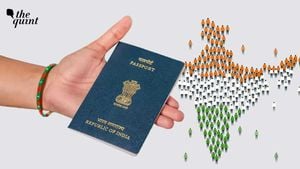Israel has made headlines again by announcing its decision to cut ties with the United Nations Relief and Works Agency for Palestine Refugees (UNRWA), an organization deemed instrumental for many Palestinian communities. This controversial move, officially communicated to the UN, was sparked by allegations from Israel claiming ties between some UNRWA employees and the October 7, 2023, attacks perpetrated by Hamas. These accusations frame the Israeli government’s decision as part of broader security concerns.
The ban, which has ignited criticism internationally, is set to take effect by the end of January 2025. This timeline is particularly concerning for the millions of Palestinians who rely heavily on UNRWA services for healthcare, education, and social support. Despite Israel's justification centered on alleged security threats, many argue the decision disregards long-established human rights protocols.
Israel’s Foreign Minister, Israel Katz, was quoted as emphasizing the need to re-evaluate the agency's role, reinforcing the sentiment among Israeli lawmakers who voted to enforce this ban. Katz noted, "UNRWA is not part of the solution but part of the problem," highlighting the deep mistrust held by many officials about the agency's operations.
Since its establishment, UNRWA has aimed to provide much-needed humanitarian aid to Palestinian refugees, who face pressing socioeconomic challenges exacerbated by years of conflict and instability. Its initiatives encompass food assistance, healthcare services, and educational programs which are particularly necessary as many Palestinians grapple with some of the world’s highest unemployment rates.
Critics of Israel's decision fear the ban may intensify the existing humanitarian crisis. According to reports, unemployment rates among Palestinians have surged, as UNRWA’s services were not merely supportive but often the lifeline for many families. With only limited access to employment and healthcare, many Palestinians could find themselves increasingly reliant on humanitarian aid.
This situation raises fundamental questions about the balance between security and humanitarian needs. Advocates believe heavy-handed policies targeting social services may lead to greater instability rather than the intended security outcomes. They argue, as discontent rises due to lack of resources, support for militant activities may unfortunately increase.
Under international law, cutting ties with UNRWA precipitates potential violations of the Universal Declaration of Human Rights, where the rights to work, earn a living, and access social protection are guaranteed. The framework of the International Covenant on Economic, Social, and Cultural Rights also highlights the state’s obligation to provide fair employment and adequate living standards. Israel’s action may create significant legal challenges on the global stage, as many view it as contrary to these treaties.
Further complicity arises when reflecting on the Geneva Conventions, which stipulate the responsibilities of occupying powers to provide essentials for the civilian population under their control. Israel's apparent decision to shrink access to such services may point to significant violations of these obligations.
On the ground, UNRWA's withdrawal stands to exacerbate the dire living conditions many Palestinian people currently endure. Reports suggest already grave situations may become unmanageable. Families who previously depended on UNRWA’s initiatives for stable access to schools and hospitals might find themselves amid imminent crises, struggling to cope or forced to seek means of support on the fringes.
Internationally, this decision from Israel is drawing sharp criticism, especially from Western allies, where human rights policies are at the forefront of diplomatic relations. Many governments express concerns this ban indicates Israel’s willingness to prioritize short-term security over long-term stability and social justice, risking diplomatic isolation.
Regional leaders, particularly from Europe and North America, have begun to question Israel's approach, raising alarms about potential boycotts, divestments, and sanctions if humanitarian principles continue to be compromised. Organizations advocating for Palestinian rights argue this could severely impact Israel's economic relationships.
The ramifications of this ban also extend beyond Palestinians, reaching neighboring countries with significant Palestinian populations. The increased economic hardship resulting from reduced support could stir discontent and unrest, influencing the broader Middle Eastern geopolitical scene.
Meanwhile, attention is being drawn to Israel's standing within international coalitions, particularly with regard to bodies like the UN Human Rights Council. Further investigations or possible sanctions against Israel's policies could follow, complicting future diplomatic relations.
The cumulative effects on Israel’s global perception prove concerning, particularly as public sentiment shifts toward supporting fundamental humanitarian rights for Palestinians. Growing advocacy among various nations mirrors the demand for policies aligning with humanitarian principles, which may alienate Israel from future global leaders and impact its international alliances.
For countries like India and those within BRICS, the situation poses substantial diplomatic challenges. India, having historically balanced its relationship with both Israel and the Palestinian territories, now finds itself at odds. India's foundational commitments to humanitarian principles dictate support for Palestinian rights, yet Israel’s stringent policies could affect its credibility within the region.
India’s significant trade partnerships with Israel, particularly within technology and defense, fluctuate against the backdrop of its economic ties with Gulf nations, which hold considerable empathy for Palestinian struggles. This delicate balancing act reflects the complex interplay between promoting human rights and preserving economic interests.
BRICS nations, frequently vocal about advocating for marginalized communities, now encounter both challenges and opportunities with Israel’s recent actions. With Western scrutiny on Israel intensifying, BRICS may see this as a chance to establish themselves as proponents of humanitarian rights globally, fostering balanced policies addressing both security and humanitarian aspects.
Looking at the economic and trade ramifications, Israel's stance could press BRICS to integrate ethical practices within their trade engagement. Advocacy for humanitarian standards is gaining traction globally, compelling nations to navigate this challenging terrain carefully.
All these dynamics compel BRICS to present themselves as multilateral advocates, reflecting their commitment to achieving equitable peace and development. Engaging with both security and humanitarian needs could solidify their global standing as balanced, progressive stakeholders.
While the situation continues to evolve, the repercussions of Israel's decision to cut ties with UNRWA may resonate beyond immediate borders, influencing regional and global equilibrium significantly.



